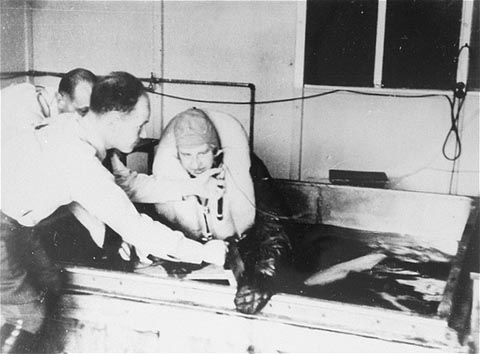Nazi Germany believed in the dominance of the Aryan race, and instituted practices of ethnic cleansing to purify the population. Sometimes they sterilized non-Aryan individuals to prevent propagation of the "unclean" races, this act was followed under the Law for the Prevention of Offspring with Hereditary Diseases of 1933. They sterilized through X-ray irradiation of the testicles or ovaries, using a variety of doses that often resulted in burns and was not even successful. Other non-Aryans were used for scientific study where death of the subject was no matter to the physicians.

Dr. Josef Mengele is one of the most famous of the Nazi doctors, performing experiments at both Auschwitz and Birkenau concentration camps. He took a great interest in experimenting with gypsy children, twins, dwarfs, and those with abnormalities. After forcing the subjects to go through harming and crippling tests, many were killed so that more experimentation could be performed on the corpses.

Experiments were also conducted in order to gain more knowledge about how the military could better persist and prosper during war. For instance, they forced subjects to remain in tanks of ice water or in the snow for long durations of time and then attempted to rewarm their bodies using different methods. They also forced subjects to remain in pressure chambers that were meant to simulate high altitude conditions in order to see how high of an altitude the Air Force could fly.

Seventy medical research programs at Nazi concentration camps with connections to the German medical establishment used human subjects for Pharmaceutical testing of drugs thought to fight infectious diseases or gas poisoning. They also sought to devise new methods to deal with wounds, often breaking the bones of subjects or amputating limbs in order to test new strategies. Over 200 Nazi doctors were involved in these programs, how they did no have a moral dilemma against participation baffles me.

The Nurenberg Trials of 1946 sentenced only 16 of these doctors to death of prison. Some of the doctors disappeared before the trials. The Court set a prescient for modern medical practice, but declaring a set of principles that must be followed in order for research to be moral, ethical and legal. This was called the Nuremberg code, and the principles (obtained here) are as follows:
1. The voluntary consent of the human subject is absolutely essential.
2. The experiment should be such as to yield fruitful results for the good of society, unprocurable by other methods or means of study, and not random and unnecessary in nature.
3. The experiment should be so designed and based on the results of animal experimentation and a knowledge of the natural history of the disease or other problem under study that the anticipated results will justify the performance of the experiment.
4. The experiment should be so conducted as to avoid all unnecessary physical and mental suffering and injury.
5. No experiment should be conducted where there is an a priori reason to believe that death or disabling injury will occur; except, perhaps, in those experiments where the experimental physicians also serve as subjects.
6. The degree of risk to be taken should never exceed that determined by the humanitarian importance of the problem to be solved by the experiment.
7. Proper preparations should be made and adequate facilities provided to protect the experimental subject against even remote possibilities of injury, disability, or death.
8. The experiment should be conducted only by scientifically qualified persons. The highest degree of skill and care should be required through all stages of the experiment of those who conduct or engage in the experiment.
9. During the course of the experiment the human subject should be at liberty to bring the experiment to an end if he has reached the physical or mental state where continuation of the experiment seems to him to be impossible.
10. During the course of the experiment the scientist in charge must be prepared to terminate the experiment at any stage, if he has probably cause to believe, in the exercise of the good faith, superior skill and careful judgment required of him that a continuation of the experiment is likely to result in injury, disability, or death to the experimental subject.
The ethical misconduct of the experimentation done by Nazi Germany forced the establishment of specific guidelines so that such lack of medical ethics will be repeated.
"In the end, most of them died of exhaustion and hunger, and doses of medicines, or they were given lethal injection. A worthless life -- that's what they called it. "Worthless life." That was the official term."
-Antje Kostmund, survivor of the Euthanasia Program
Information about the experiments was found here.
An online exhibition by the United States Holocaust Memorial Museum can be found here.

Very touching post Julia!
ReplyDeleteSometimes is good to remember why in research we have so much bureaucratic paperwork to do in order to start experiments. I hear people often complaining about how many training they have to go through in order to work with mice. I've also heard a lot people complaining about the paperwork and the consent forms that they have to fill out in order to receive patients samples. I think that they should go back and remind themselves why they are required to put so much effort to protect the ethical work. The Nazism was the clearest example of unethical research, but we don't have to go across the ocean to find example of misconduct in research. A lot of prisoners, children and black people were used here in the United States to conduct trials without their consent.
I think that once in a while is good to everyone to think about why we have these rules to follow.
My congratulations for the very important article you posted!
A very thoughtful post. As a scientist, it's so easy to be desensitized to the importance about the mundance paper work and training we must to do be authorized to run experiments. I've even found myself glibly rolling my eyes at older papers that use prisoners to determine the disease pathogenesis of dengue, just brushing past the ridiculousness about how recently these experiments were "okay" to do. It's important to take the time to slow down and really take into account why we must take responsibility for our research and why there is so much oversight.
ReplyDeleteThe sort of human experiments carried out during the Holocaust was a travesty. And the importance of the Nuremberg Trials are invaluable. Something to think about as we all sit through our ethics seminars as part of our graduate training.
This is a great example to bring up of just one instance in history where scientists seemed to lose all good moral judgement in the name of advancement. Have you read The Immortal Life of Henrietta Lacks?
ReplyDeleteThe stories told in that book are equally gut wrenching and along much the same vein--using humans as research subjects without their permission. It begs the question, what do we do now in our daily practices as researchers that in 50 or 100 years people will look back on as painfully, obviously immoral or unethical? Are we as blind to our own shortcomings as those scientists were?
The HeLa cells were isolated from Henrietta in 1951, prior to her death, and were propagated and studied by scientists without her permission or that of her family. And that was 5 years after Nuremberg! Why was it okay? Because it was her tumor and no longer part of her? Because she was already dead? I highly recommend reading the book and considering the real implications of our actions.
Currently, discarded tissue specimens such as the foreskins (that we isolate keratinocytes from to study in my lab) are not required to be consented and blinded once they've been donated to science. There's murmurings that the NIH will begin requiring ALL human derived tissue samples to be consented for the specific project they are to be used for with consent expiring after a given time frame (ie five years). There are, perhaps, moral reasons for wanting these rules in place, however there are major concerns as well. Patients/ parents will have to consent to the tissue being used, potentially many times, creating logistical nightmares for the hospital and researcher. The biggest nightmare though is the potential loss of decades worth of samples stored in freezers around the country that would no longer be 'legal' to study and publish with. There are entire fields that could be set back years, if not destroyed entirely, if the NIH adopts these regulations.
But if they don't, is it any different than what science did to Henrietta Lacks? A difficult but necessary discussion for sure, so thank you for bring it up here!
I also want to echo my congratulations and thankfulness for this poignant reminder of the ethical obligations we have as scientists to society. There were so many principles of the Nuremberg code that struck me as I read them. I love the emphasis on the pursuit of fruitful results that will benefit society, and come from a knowledgeable background of the problem and no better alternatives to pursuing the results. But how terrible a realization when thinking of the many people who were experimented on without such benefits in mind or justification in hand. I was also struck by the fifth principle, stating that experiments where there is a perceived risk of death or disabling injury could not be conducted unless the experimenters themselves were willing to participate. I love that this basically writes in an "anti-dehumanization" clause, but again, how sad that it was not the standard before. Finally, I thought it was interesting to think about some of the other "principles" included in our ethical stewardship of research using humans, namely, the emphasis put on stripping personal information from patient samples, etc. We can obviously see some experimental reason for blinding samples to a degree, but also the personal reasons people might have for wanting to protect their information, especially in our modern day society. I am curious to see what other principles in research ethics become incorporated into our code.
ReplyDeleteVery nice post. It is hard for me to believe that someone would do this kind of research and be okay with it. But it is also more surprising that this is not only an issue with the Nazis. There are scientists today that would probably jump at the chance to do horrible experiments similar to these. Even more recently with the Tuskegee experiments prove that these types of experiments can happen anywhere at any time, even today in this country. That is why having a strong foundations in ethics is important for every scientist.
ReplyDeleteI would like to add my congratulations to you for writing such a moving and heart-wrenching post. While we may have the comfort of feeling removed from the Holocaust in every day life, it is all too important to be reminded of this travesty that shook our collective psyche less than eighty years ago, and has left so many imprints on our modern existence. The Nuremberg code is an irreplaceable standard that draws the hard boundary of what separates science from masochism, inquiry from torture. As illustrated so poignantly in the images you included, the opposite side of that line is a cruel, inhumane place that we have vowed never to venture again.
ReplyDeleteI think this post also dovetails very nicely with the lecture of our guest speaker a few classes ago. He spoke about the Nuremberg trials, and posed the question: what do we do with the data that was generated from these inhumane experiments? Certainly, we can all agree that the practices used to obtain the data were the most reprehensible examples of human conduct imaginable, that should not be endorsed on any level. But the despicable trials were conducted, nonetheless, and information was generated. What should be done with that now?
The speaker himself, as I remember, was torn. On the one hand, out of respect for the victims, he argues that the information be discarded wholesale. What good are our ethics if we are willing to benefit from such wicked acts? Can the ends really ever justify the means?
To a similar point, though taking a more pragmatic stance on it, he argues that the results should be discarded because they were not derived by scientific means. By violating all ethical standards and obtaining these data under extreme duress, these practices can truly no longer considered science, making their data simply not valid enough to draw conclusions from.
The third, and final option, of course, is to consider the findings of the experiments for what they are. This option is certainly the most controversial, the one that inches perilously close to the edge of the slippery slope, but is the one that I am most drawn to. Without a doubt, the event that led to the creation of these data was vile, it should never be repeated, and every remnant that resulted from the practices involved should forever inspire a shudder of revulsion in all who look on it. But I can't help but cling to the notion that some scrap, some shred of good must come out of this. These people, these victims, can't have been forced to suffer through these atrocities in absolute vain. There are no easy answers, for certain. This is not a question that will be answered overnight, if ever. But if one life can be spared, can be improved by the knowledge born from the immense suffering that these martyrs were made to endure, then perhaps some sense can be scavenged from this, history's greatest travesty.